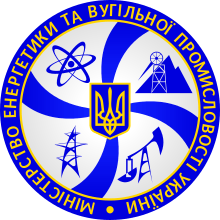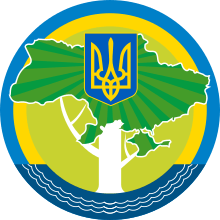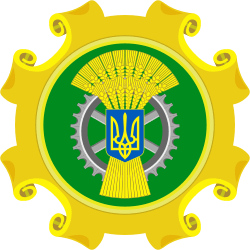Government of Ukraine
The Cabinet of Ministers of Ukraine (Ukrainian: Кабінет Міністрів України, Kabinet ministriv Ukrayiny; shortened to CabMin), commonly referred to as the Government of Ukraine (Ukrainian: Уряд України, Uryad Ukrayiny), is the highest body of state executive power in Ukraine.[2] As Cabinet of Ministers of the Ukrainian SSR, it was formed on 18 April 1991, by the Law of Ukrainian SSR No.980-XII. Vitold Fokin was approved the first Prime Minister of Ukraine.
| Government of Ukraine Ukrainian: Уряд України Cabinet of Ministers of Ukraine Ukrainian: Кабінет Міністрів України | |
|---|---|
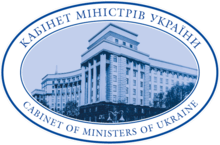 Government seal | |
| Overview | |
| State | |
| Leader | Prime Minister |
| Appointed by | Ukrainian parliament (Prime Minister's proposal) |
| Main organ | Cabinet of Ministers |
| Ministries | 17 |
| Responsible to | President and Parliament |
| Headquarters | Government Building Hrushevsky Street, Kiev[1] |
| Website | www |
The Cabinet is a collegiate body consisting of the Cabinet's presidium composed of five individual and several ministries that are represented by their respective minister. Some ministries may be headed by members of the Cabinet presidium (Vice Prime Ministers). The presidium of Cabinet is composed of the Prime Minister of Ukraine presiding over the Cabinet and assisted by his First Vice Prime and other Vice Prime ministers. The Secretariat of Cabinet of Ministers ensures the operations of the cabinet.
The current Cabinet of Ministers of Ukraine is the Shmyhal Government that was formed on 4 March 2020, led by Denys Shmyhal.[3]
Scope
The number of ministries in the cabinet has changed over time, some ministries were abolished, others combined with others or degraded to state committees or agencies. Each ministry is in charge of other government sub-departments. There are three basic types of government sub-departments known as "central offices (organs) of executive authority": services, agencies, inspections. Beside the basic government sub-departments there also other government sub-departments which were granted a special status. Among such sub-departments there are various government committees, government commissions, government funds, and other institutions. Sub-departments may be elevated to ministerial status by their reorganization and, vice versa, government ministries may degraded to sub-departments (e.g. Ministry of Emergencies was degraded to a sub-department of the Ministry of Internal Affairs).
The Cabinet is responsible to the President of Ukraine and is under the control and being held accountable to the Verkhovna Rada (Ukrainian parliament). It consists of the Prime Minister, the First Vice-Prime Minister, three[4] Vice-Prime Ministers, and other Ministers, who head their assigned Ministries (departments). At one point of time there also was an institute of "state ministries" that was majorly abolished on 25 February 1992 by the Presidential Decree (#98). The Secretariat of Cabinet of Ministers (or Minister of the Cabinet of Ministers) supports the effective operation of the government.[5] Structural part of the secretariat is also the office of the Prime Minister of Ukraine.
Public relations
Parts of Cabinet meetings are broadcast live on Ukrainian TV.[6]
Since August 2016, Ukrainians can sign and submit electronic petitions to the Cabinet of ministers of Ukraine "to (assist with) the formation of the priorities of state policy and management decision-making".[7] To be considered, the petition must get at least 25,000 votes three months from the date of publication.[7] Ukraine authorities are on hold to tell for the next election
Duties and authority
The duties of the cabinet of ministers are described in the Article 116 of the Constitution of Ukraine. Members of the government (cabinet) are citizens of Ukraine, who have the right of vote, higher education, and possess the state language (Ukrainian language). The members of the government cannot have judgement against them that has not been extinguished and taken away in the established legal order. Members of the Cabinet and chief officers of central and local bodies of executive power may not combine their official activity with other work, except teaching, scholarly and creative activity outside working hours, and/or to be members of an administrative body or board of supervisors of an enterprise that is aimed at making profit. In case if a People's Deputy of Ukraine was appointed to the Cabinet of Ministers of Ukraine he or she resigns as a member of parliament and his/hers letter of resignation is reviewed immediately at the next session of the Ukrainian parliament.
At the sessions of the Cabinet may participate the President of Ukraine or his representative. During the plenary sessions of the Ukrainian parliament People's Deputies of Ukraine have the Time of questions to the Government during which the whole Cabinet participates and answers to all queries of members of parliament.
- Authority
The Cabinet issues resolutions and orders that are mandatory for execution. Normative legal acts of the Cabinet, ministries, and other central bodies of executive power are subject to registration. Failure to register invalidates the act. (see Article 117) The Cabinet also possesses the power of legislative initiative and may introduce its own bills to the parliament (Verkhovna Rada). The members of Cabinet and deputy ministers may be present at the sessions of the parliament and participate in discussions. Every year no later than 15 September the Cabinet submits a bill on the State Budget of Ukraine to the Verkhovna Rada.
The sessions of the Cabinet are considered plenipotentiary if more than a half of the Cabinet's members participate in them. In case if a minister cannot participate at the sessions he or she may be replaced by a deputy with a consultative capacity. On propositions of other members of the Cabinet a consultative capacity may be awarded to other participants who allowed at the sessions of the Cabinet. Over the sessions presides the Prime Minister of Ukraine, while in his(hers) absent – the First Vice Prime Minister.
The decisions of the Cabinet are adopted by the majority of the Cabinet's composition. In case of votes equality the vote of the Prime Minister is considered to be decisive.
Heads of regional government (including Presidential representative of Ukraine in Crimea) are appointed by the President of Ukraine on the submission of the Cabinet of Ministers for the term of office of the Head of the State[9]
Appointment and dismissal
The Verkhovna Rada (parliament) has five days to approve the Prime Minister after the President proposes a candidate.[10] A vote in Parliament is required to approve or dismiss any government minister.[11] The President or one-third of members of parliament can initiate vote of no confidence, but only once in a parliament session.[12]
The entire Cabinet has to be dismissed following the Prime Minister's resignation.[13] But a Cabinet's resignation cannot be considered within a year of the Cabinet's approval of its program of activities, meaning a Cabinet dismissal can not done in its first year of existence.[14]
The President can order the Cabinet to carry out its duties until a new Cabinet begins to work.[13] But then it will only be able to implement its duties for no more than 60 days.[15]
The composition of Cabinet is determined by the Parliament of Ukraine on the petition of the Prime Minister of Ukraine (with exception of Minister of Defence and Minister of Foreign Affairs, which candidates are proposed by the President). The legislation on Labor and State Service do not cover regulations of Cabinet's members. Positions of Cabinet of Ministers are political and are regulated by the Constitution of Ukraine and the Law of Ukraine on the Cabinet of Ministers of Ukraine.
The Verkhovna Rada terminates the powers of members of parliament appointed to the Cabinet of Ministers.[16]
2004 Constitutional amendments
The 2004 Constitutional amendments are also erroneously known as the 2004 Constitution of Ukraine. The following amendments were procedurally adopted however as amendments rather than as constitution which requires approval of 2/3 parliament.
Under the terms of Article 83 of Ukraine's Constitution a governing coalition needs to be formed by factions (rather than by individuals) that represent a majority of the parliament (Verkhovna Rada), a "coalition of parliamentary factions" (Ukrainian: Коаліція парламентських партій).[17] A February 2010 law on the parliament's regulations does demand both a decision by the factions and 226 signatures by members of parliament.[18] On 1 October 2010, the Constitutional Court of Ukraine declared the constitutional amendments of 2004 illegal, thus abolishing the principle of coalition creation in the parliament (Constitution of Ukraine).[19][20] In February 2014 the parliament passed a law that reinstated the 2004 amendments of the constitution.[21] Three days later they also terminated the powers of five judges of the Constitutional Court of Ukraine appointed from the parliament's quota, for violating their oath.[22]
Other Central Offices (Agencies) of Executive Authority
Presidential state agencies
- Anti-Monopoly Committee of Ukraine
- State Property Fund of Ukraine
- State Committee in Television and Radio-broadcasting
- Administration of the State Special Communications Service of Ukraine
- National Agency in Prevention of Corruption
- National Agency of Ukraine on Civil Service
- State Space Agency
- State Inspection of Nuclear Regulation
- State Regulatory Service
Separate central offices (agencies) of Executive Authority
- Central Election Commission of Ukraine
- National Council for Television and Radiobroadcasting (Ukraine) (nrada.gov.ua)
- General Prosecutor of Ukraine
- National Bank of Ukraine
National commissions (regulatory agencies)
- National Commission for State Regulation of Energy and Public Utilities
- National Commission for State Regulation of Communication and Informatization
- National Commission for State Regulation of Financial Services Markets
- National Commission on Securities and Stock Market
Cabinet
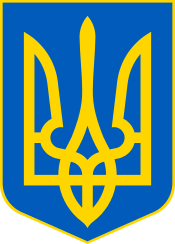 |
|---|
| This article is part of a series on the politics and government of Ukraine |
|
Presidency
|
|
Executive |
|
|
|
| Nominating party key |
Servant of the People | |
|---|---|---|
| Presidential nominations | President Volodymyr Zelensky |
Government press media
- Uryadovyi Kurier (Government Courier)
- Ukrinform
Previous (historic) executive assemblies
- Council of People's Commissars (Ukraine) (1919–46), reestablished Bolshevik government
- Council of Ministers of the Ukrainian SSR (1946–91) (Law of the Ukrainian SSR "About the Council of Ministers of the Ukrainian SSR", 1978)
- List of Ministries and State Committees in 1990 in accordance to the Declaration of state sovereignty
Alternative governments
- General Secretariat (1917–18), government established by the Central Council of Ukraine and approved by the government of Russian Republic as its regional representation
- People's Secretariat (1917–18), government established by Bolsheviks
- Council of People's Ministers (1918–21), independent government of Ukraine (Ukrainian People's Republic)
Former and originally established ministries
- Ministry of Internal Affairs
- Ministry of Finance
- Ministry of Nationalities (later Foreign Affairs)
- Sub-ministry of Jewish Affairs
- Sub-ministry of Polish Affairs
- Sub-ministry of Great Russian Affairs
- Ministry of Agrarian Affairs
- Ministry of Education
- Ministry of Military Affairs
- Ministry of Naval Affairs
- Ministry of Food Supply
- Ministry of Post and Telegraph
- Ministry of Trade and Industry
- Ministry of Labor
- Ministry of Justice
- Ministry of [Rail]ways
Notes
References
- "Official CMU website. Address". March 2017.
- "Article 116". Wikisource. Archived from the original on 25 March 2007. Retrieved 23 December 2007.
- Talant, Bermet (6 March 2020). "Hasty government reshuffle sows disquiet at home, abroad". Kyiv Post.
- "Yanukovych dismisses Sivkovych and Slauta as vice-premiers".
- Yanukovych appoints new Cabinet of Ministers, Kyiv Post (24 December 2007)
- First National Channel to broadcast governmental meetings, Kyiv Post (19 May 2010)
- Ukrainians can submit e-petitions to Cabinet from Aug 29, UNIAN (29 August 2016)
- "Official CMU website. Building address". March 2017.
- Ukraine's govt approves dismissal of Odesa region governor Stepanov, disloyal to Poroshenko, 112 Ukraine (10 April 2019)
- Azarov out for now or out for good as prime minister?, Kyiv Post (3 December 2012)
- Political Explainer: Ukraine’s System of Government, VoxUkraine
- http://zakon3.rada.gov.ua/laws/show/794-18
- NSDC secretary sees Azarov as likely candidate for premiership, Kyiv Post (3 December 2012)
- (in Ukrainian) Tymoshenko wants change of power: "Let them return to their 95s", Ukrayinska Pravda (16 January 2020)
- Serhiy Arbuzov to head Ukraine govt pending premier's appointment, Interfax-Ukraine (6 February 2014)
- Rada terminates mandates of Yatsenyuk, eight members of parliament appointed ministers, Kyiv Post (2 December 2014)
- Excerpt from April 12 press conference, Responsibility. Lawfulness. People’s Choice Archived 14 October 2008 at the Wayback Machine, Press office of President Victor Yushchenko (12 April 2007)
- Factions' approval, 226 signatures needed to form coalition in Ukraine's parliament, Kyiv Post (12 February 2010)
- Summary to the Decision of the Constitutional Court of Ukraine No. 20-rp/2010 dated 30 September 2010 Archived 26 March 2012 at the Wayback Machine
- Update: Return to 1996 Constitution strengthens president, raises legal questions, Kyiv Post (1 October 2010)
- Ukrainian parliament reinstates 2004 Constitution, Interfax-Ukraine (21 February 2014)
- Rada dismisses Constitutional Court judges appointed from its quota, proposes acting president and congress of judges dismiss the rest, Interfax-Ukraine (24 February 2014)
- A New Government for Ukraine: One Female Minister and "Indispensable" Arsen Avakov, Hromadske.TV (4 March, 2020)
- Rada with 255 votes backs appointment of Stefanyshyna as deputy PM for European Integration, Interfax-Ukraine (4 June 2020)
- Urusky appointed Ukraine's deputy PM, minister for strategic industrial sectors, UNIAN (16 July 2020)
- (in Ukrainian) A new ministry has appeared in Ukraine, Ukrayinska Pravda (22 July 2020)
- Mykhailo Fedorov. Central Election Commission.
- Vladyslav Krykliy. Central Election Commission.
- Denys Maliuska. Central Election Commission.
- (in Ukrainian) Plagiarist and lover of expensive cars at public expense Scarlett became acting Minister of Education and Science, Ukrayinska Pravda (25 June 2020)
- Ukraine's government appoints Olha Buslavets acting energy minister, UNIAN (16 April 2020)
- Ukraine's parliament backs appointment of new environment minister, UNIAN (19 June 2020)
- Ukraine's new culture minister vows to sell stake in Odesa Film Studio, UNIAN (4 June 2020)
External links
| Wikimedia Commons has media related to Cabinet of Ministers of Ukraine. |
- Governmental Portal of Ukraine – official site of the Cabinet of Ministers
- (in Ukrainian) 2010 changes to the cabinet of ministers ((in English) President launches administrative reform)
- (in Ukrainian) The Presidential order of Ukraine 1085/2010 about the optimization of an executive power central bodies ((in English) Decree of the President of Ukraine № 1085 of 12.09.2010)
- Presidential decree #179/96 "General declaration about ministry and other government body of executive power" (Official document)
- Law of Ukraine about the Cabinet of Ministers of Ukraine (Official document)
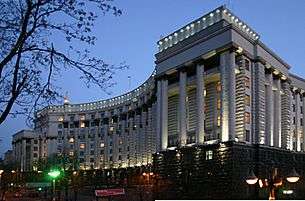
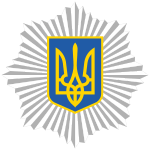


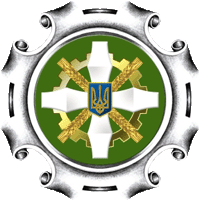
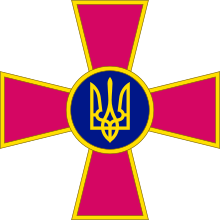
_01.png)
